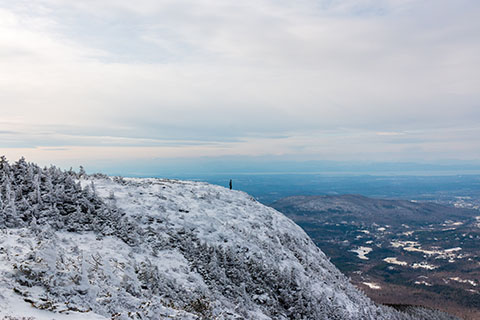
By Tynan Reed
Staff Writer
It might only be the first week of December, but we have already made the walk from Alliot to the academic buildings with snow at our feet and the cold wind in our faces.
When you think of winter, snow usually crosses your mind. From having to shovel the driveway or get in your truck to plow the streets, snow means different things to different people.
Wilson “Snowflake” Bentley’s, connection to snow led to international recognition. He lived in Jericho, from 1865 to 1931. In his teens, he had a fascination with ice crystals. This would lead him on his lifelong mission to photograph snowflakes. By the time of his death, he had taken close to 2500 photos, nearly all of them single or groups of snowflakes. You can see some of his photographs in a small museum in Jericho.
Like Bentley, some people, snow is a part of what they do for a living. Snow is essential for the Adventure Sports Center at St. Michael’s College because it provides opportunities for the activities that the center can run during the wintertime.
“Snowshoeing, ice climbing, and backcountry skiing are what we offer and without snow all three of those are difficult,” said Eben Widlund, assistant director of the Adventure Sports Center.
Widlund said that there have been seasons when they did not have any backcountry ski trips due to the lack or unpredictability of the snowpack. From a personal viewpoint, his commute to work takes a lot longer than he would like when there is substantial snow. Yet, he still has a very personal connection with snow, loving winter sports such as ice climbing and mountaineering, even though he has been involved in multiple avalanches in Smuggler’s Notch.
While people are at odds with the state of today’s climate, snow still has a beneficial impact.
“Snow in an environmental state is incredibly important to environmental science,” said Madaline Shanley ‘20, a sophomore environmental science major.. “The fact that snow happens is huge, and for animals everywhere, it is vital. When we talk about snow keeping the water cycle going, that is one of the main things that makes it super important to me,” Shanley is also a skier and says that skiing has given her a lot of happiness throughout life.
English Professor Joan Wry teaches a freshman seminar about snow and ice, which she calls the “snow seminar.” In the course, students learn about snow and ice through examples such as polar expeditions and the impact of climate change. Additionally, students get to go on a class trip to the Snowflake Bentley museum and the snowmaking center for Smuggler’s Notch.
“My own experience has been influenced by a family connection with the ski industry over the past 40 years, as my husband worked in ski area management in Vermont as well as in the Sierras and Eastern Arizona. He retired two years ago after 30 years as vice president of Smugglers Notch, Mountain Operations,” said Wry.
In Wry’s class, students gain an understanding of snow formation in nature and the science behind snowmaking at ski mountains. However, Wry said that what snow means to someone is based on their understanding and experience.

